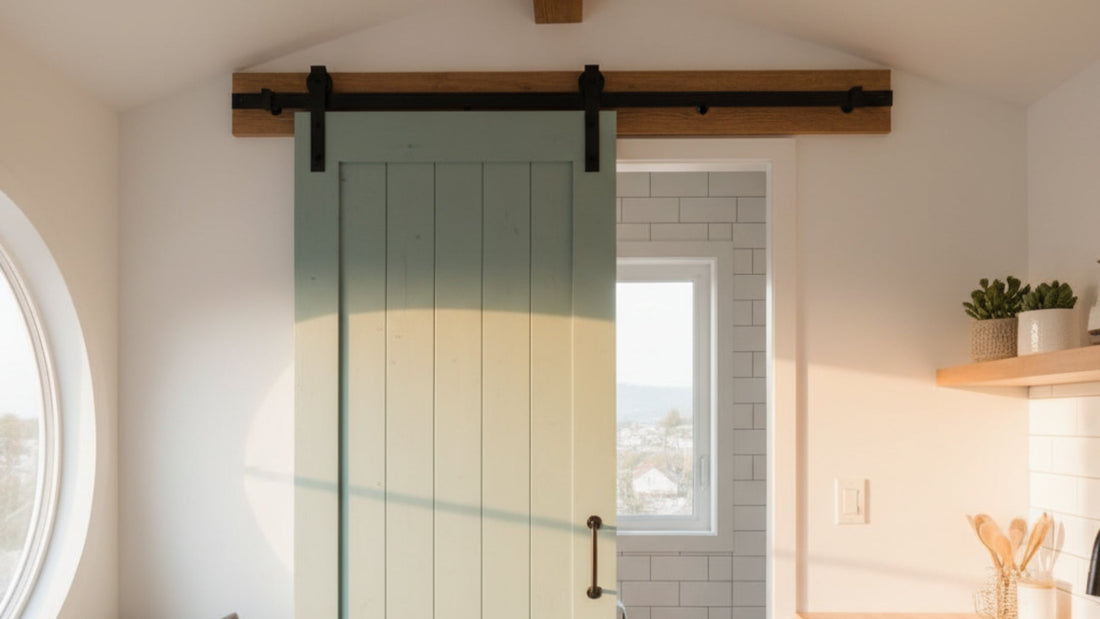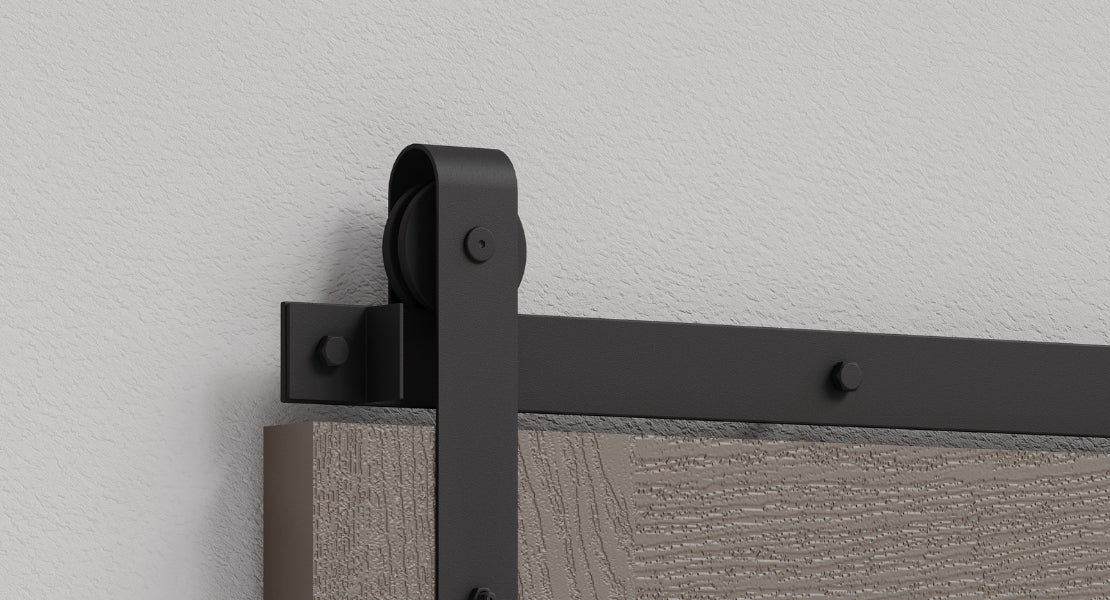
Quiet Barn Door Solutions: Stop the Squeaks, Rattles, and Rumbling
Does your barn door sound like rumbling thunder every time you open it?
It’s a common problem both for homeowners who have had a new barn door installed and those who have had one for a long time and have had its fair share of wear and tear.
Fortunately, you don’t need to live with its squeaking rollers that wake the whole house, rattling hardware that sounds cheap, and doors that slam shut with enough force to rattle the walls.
Here's the thing: a well-functioning barn door should operate almost silently.
When your door sounds like a freight train, it's telling you something needs attention. The good news? Most noise problems are completely fixable, often with simple solutions you can tackle yourself.
Whether you're dealing with squeaks that make you cringe every time you use the bathroom, or rumbling that echoes through your house when kids enthusiastically slide doors, this guide shows you exactly how to eliminate barn door noise for good.
The four main types of barn door noise (and what they mean)
Before we dive into solutions, let's identify what you're dealing with. Different noises point to different problems, and the fix depends on what's actually causing the sound.
- Squeaking and grinding is the classic "nails on chalkboard" sound that happens every time you slide the door. The culprit? Usually dry rollers or dirty tracks. Metal-on-metal contact without proper lubrication creates that high-pitched squeal that makes everyone in the house wince.
- Rattling and vibrating means your door sounds loose and shaky when it moves. You're probably dealing with hardware that's worked itself loose over time. Mounting screws back out, rollers develop play in their bearings, and suddenly your door sounds like it's about to fall apart.
- Rumbling thunder is that deep, echoing sound that usually means you've got a heavy door running on hardware that's not up to the task. When rollers are too small or tracks are too light for the door weight, every movement creates that ominous rumbling that carries through the whole house.
- Slamming and banging is the loudest offender—doors that crash into their stops with enough force to shake the walls. This happens when there's no mechanism to slow the door down as it reaches the end of its travel.
Quick fixes: lubrication solutions
Let's start with the easiest and most cost-effective solution: proper lubrication. Many barn door noise problems can be solved with the right lubricant applied correctly.
Choosing the right lubricant starts with understanding your options. Silicone spray is your best all-around choice. It penetrates well, doesn't attract dust like oil-based lubricants, and works in all weather conditions. White lithium grease is excellent for heavy-use applications—it stays put longer but can collect some dust over time.
Avoid WD-40 for long-term solutions. While it works great for initial cleaning, it's designed as a penetrating oil and water displacer, not a long-term lubricant. It'll quiet your door temporarily but attract dirt that makes the problem worse.
Never use cooking oil (goes rancid and attracts bugs) or bar soap (builds up residue that can actually make doors stick).
The right way to lubricate makes all the difference:
Start with cleaning. Use a brush or vacuum to remove debris from tracks, then wipe down with a damp cloth. Pay special attention to the roller bearings—dirt here causes most squeaking problems.
Apply lubricant strategically. Focus on roller bearings, the contact points where rollers touch the track, and any adjustment points on your hangers. A little goes a long way—over-lubricating just attracts more dirt.
Work the door several times to distribute the lubricant, then wipe away any excess. Your door should now slide smoothly and quietly.
Maintenance schedule depends on usage. High-use doors (daily family bathroom, busy closets) need attention every 3-4 months. Moderate use doors can go 6 months between treatments. In humid environments, check more frequently—moisture accelerates the breakdown of lubricants and promotes rust.
Hardware upgrades for permanent quiet operation

If lubrication helps temporarily but the noise keeps coming back, you're probably dealing with hardware that's just not built for quiet operation. Here's what separates the squeaky systems from the silent ones.
Roller quality makes all the difference. Budget rollers typically use plastic wheels with basic sleeve bearings. They work initially but wear quickly, develop play that causes rattling, and the plastic can actually deform under heavy loads.
Quality rollers feature steel or engineered nylon wheels with sealed ball bearings. The difference in operation is immediate—they roll smoothly, stay aligned properly, and the sealed bearings keep dirt out so they maintain their quiet operation for years.
Upgrading rollers costs more initially, but it's absolutely worth it. We've seen customers go from daily lubrication requirements to annual maintenance just by upgrading their rollers.
Track system considerations matter for noise levels.
Flat track systems can be very quiet with the right setup, but track quality matters. Heavier gauge steel provides a smoother rolling surface and reduces vibration. Look for tracks with a smooth, consistent finish—rough or painted surfaces create more friction and noise.
Box rail systems are naturally quieter because the enclosed track protects rollers from debris and provides superior weight distribution. They cost more initially but often deliver hospital-quiet operation right out of the box.
Premium features that reduce noise include sealed bearings that keep dirt and moisture out, adjustable hangers that let you fine-tune door alignment, and anti-jump disks that prevent the door from bouncing on the track.
Some premium systems include rubber cushioning between metal components to dampen vibration—a small detail that makes a huge difference in noise levels.
Soft-close systems: The ultimate solution
If you really want to eliminate barn door noise completely, soft-close hardware is the gold standard. These systems use hydraulic mechanisms that catch your door about 2 inches before it reaches the end of travel, then guide it smoothly and silently to its final position.
How soft-close works is elegantly simple.
A small hydraulic damper installed near the end of your track engages automatically when the door approaches. No matter how enthusiastically someone pushes the door, the soft-close system absorbs the excess energy and delivers just enough force to complete the closing motion gently.
Benefits beyond noise include major safety improvements—no more pinched fingers or doors bouncing back when they hit stops too hard. Hardware protection extends the life of your entire system by eliminating impact stress. And honestly, it just feels premium. Guests always comment on how refined the door operation feels.
Installation and cost are more manageable than you might expect.
Most soft-close systems are designed for DIY installation and can be retrofitted to existing hardware in 30-60 minutes. Expect to spend $75-150 for retrofit kits, or add $100-200 when buying new hardware with soft-close built in.
For heavy doors over 200 pounds or complex bypass systems, professional installation is worth considering—proper adjustment is critical for optimal performance.
How to make the smart choice for quiet operation

Start with the simplest solution—proper lubrication costs under $10 and solves many noise problems immediately. If that doesn't provide lasting relief, hardware upgrades are your next step.
For doors that get daily use, investing in quality rollers and soft-close systems pays dividends in reduced maintenance and better user experience. The sound of quality hardware is silence.
Remember, quiet barn doors aren't just about reducing noise—they feel more substantial, operate more smoothly, and add genuine value to your home. When your door glides silently and closes with a gentle whisper, that's when you know you've got it right.
Conclusion
Don't let noisy barn doors disrupt your home's peace and quiet. Start with proper lubrication for immediate improvement, then consider hardware upgrades for long-term solutions.
The path to whisper-quiet operation is straightforward, the results are immediate, and the peace and quiet? Absolutely priceless.
The Barn Door Hardware Store offers complete noise reduction solutions—from premium sealed bearing rollers to professional-grade soft-close systems.
Our quiet operation hardware is backed by our limited lifetime warranty and comes with detailed installation guidance to ensure silent, smooth performance for years to come.


